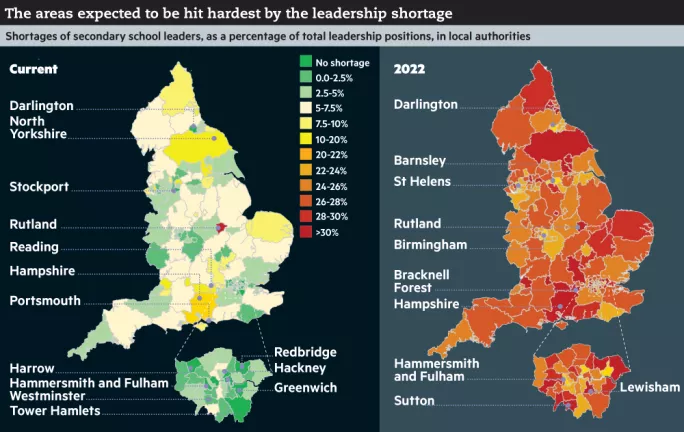Schools need to bring in more non-teachers to fill “executive roles” if they are to confront a projected shortage of up to 19,000 leaders by 2022, according to a report published today.
A quarter of schools in England will be affected by the shortages, with rural, coastal and deprived areas hit the hardest, the joint study from the training organisations the Future Leaders Trust, Teaching Leaders and Teach First warns.
It sets out plans to develop a new generation of school leaders, which include “building the brand of school leadership” to encourage more teachers - particularly those from under-represented black and minority-ethnic backgrounds - to step up.
The report, The School Leadership Challenge, also suggests that schools “explore expanding the pool of candidates for non-teaching executive roles to those outside the profession”.
The idea received a cautious welcome from Malcolm Trobe, interim general secretary of the Association of School and College Leaders. “It is fine to bring people in to executive levels to take on non-teaching responsibilities if they have a relevant and appropriate set of experiences and they are engaged with the culture of educational establishments,” he said.
Exodus of senior staff
The report says that the “looming leadership crisis” is down to a high number of school leaders leaving, combined with a lack of people willing to take on such roles and a rise in pupil numbers. “Schools facing the greatest challenges - such as those in deprived areas - need strong leaders to drive forward improvements,” Brett Wigdortz, founder and CEO of Teach First, said. “But it is in these areas where the problem is more acute.”
The study - which defines leadership roles as heads, deputy and assistant heads, heads of school, executive heads and chief executives - identifies four main challenges in increasing leadership numbers:
* Potential applicants are often deterred by leadership roles and are not effectively incentivised to apply.
* Recruitment and placement is inconsistent, with issues particularly acute in some areas.
* Leadership development opportunities are limited and variable.
* Leaders don’t get the level of support or feel the motivation that would keep them in leadership roles.
The report also says that more needs to be done to promote women teachers, and black and minority-ethnic teachers. “Many potential leaders could be found in existing female, and black, Asian and minority ethnic, teachers already in the workforce,” it states.
The authors say that with five years’ experience, high-performing teachers can be ready to move into senior leadership - and estimate there are 240,000 teachers in this position.
Currently secondary schools are suffering most from the leadership shortage, the report states, but by 2022 both primaries and secondaries will be affected.
The report’s authors estimate there is an existing shortage of between 2,000 and 3,000 school leaders. But,in addition, over the next six years the profession is expected to lose around 8,000 leaders through retirement or people leaving the profession. Lastly, up to 8,000 new leaders may be needed to meet a growth in leadership positions, such as executive heads and CEO roles, making a shortfall of up to 19,000 posts.
The Department for Education said it did not recognise the figures. Since 2010, the proportion of schools reporting headteacher vacancies had decreased. But it recognised the need to develop more “great school leaders”.
@teshelen

